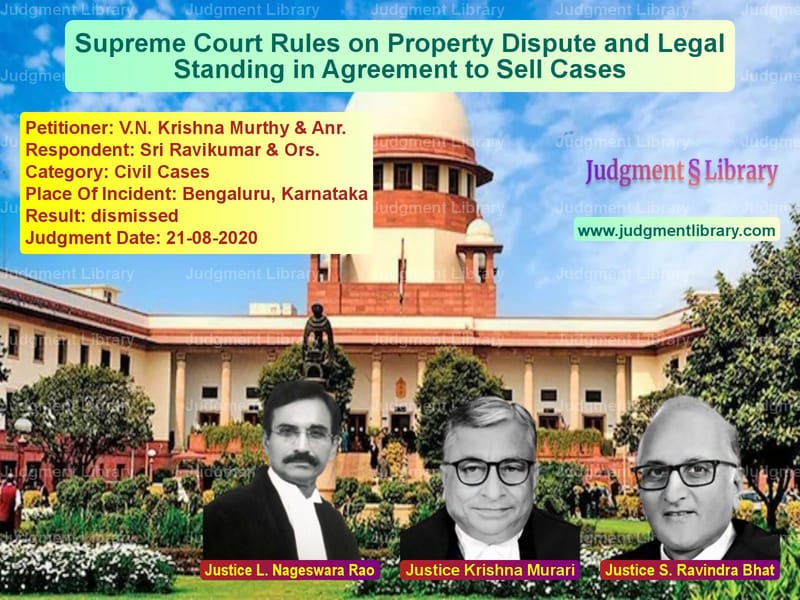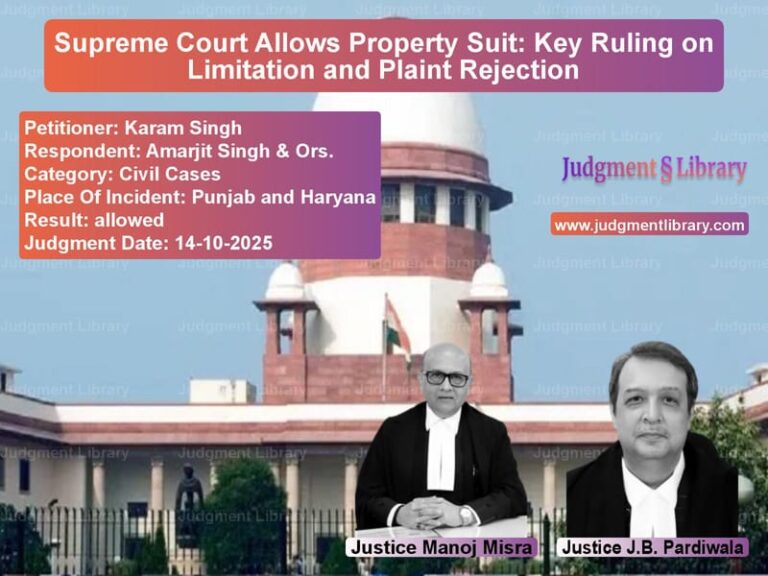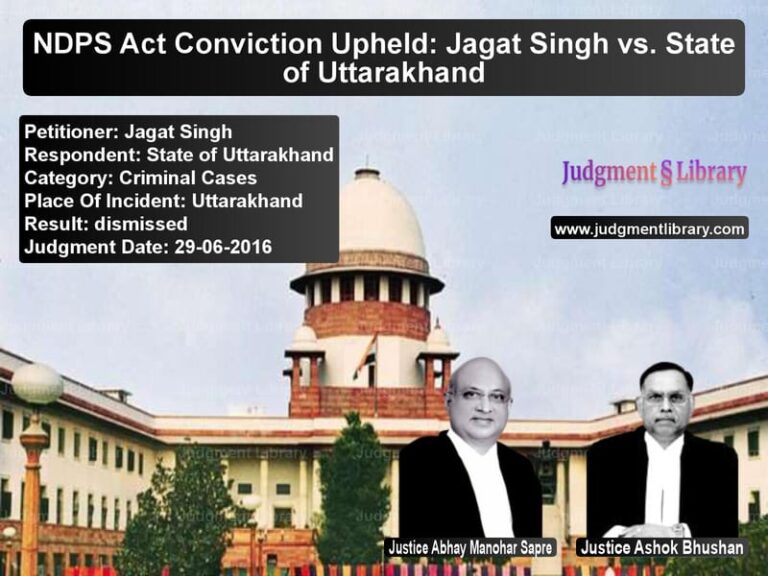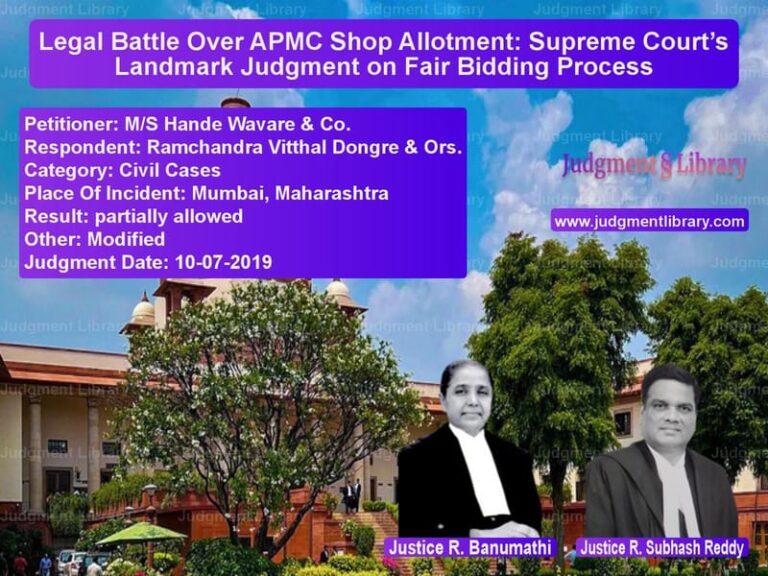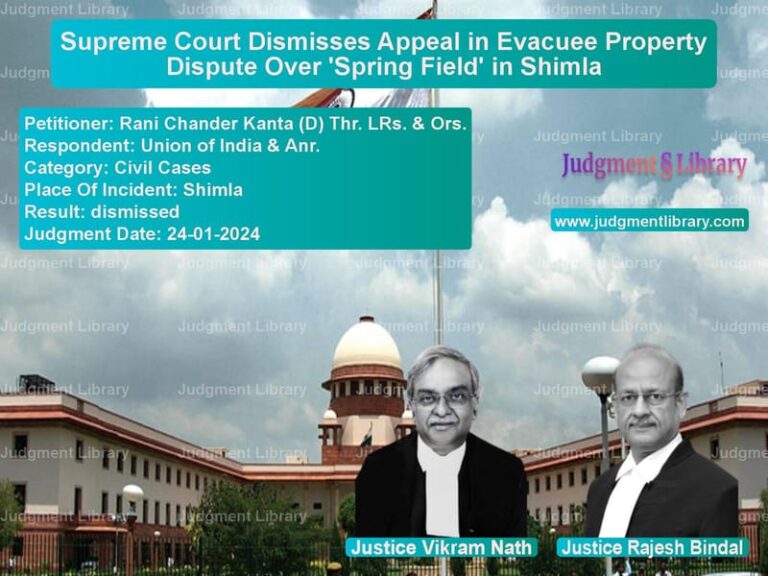Supreme Court Rules on Property Dispute and Legal Standing in Agreement to Sell Cases
The Supreme Court in the case of V.N. Krishna Murthy & Anr. vs. Sri Ravikumar & Ors. adjudicated on a significant legal dispute concerning land ownership, agreements to sell, and the legal standing of third-party appellants seeking to challenge trial court judgments.
Background of the Case
The dispute revolved around land situated at Village Jakkur, Bengaluru, with different portions of land in Survey Nos. 105/3, 105/9, and 105/4B. The recorded owners of the land, Respondents Nos. 5 and 6, had executed a registered agreement to sell in favor of Karnataka State Khadi and Village Industries Worker’s House Building Co-operative Society Ltd. Additionally, a General Power of Attorney (GPA) was executed in favor of the office bearers of the respondent society, granting them authority to execute sale transactions.
Based on the GPA, multiple sale deeds were executed in favor of the appellants. However, the plaintiffs (respondents) later filed original suits seeking cancellation of agreements to sell, claiming that these agreements were barred by limitation and that they were unenforceable.
Arguments by the Petitioners (V.N. Krishna Murthy & Anr.)
- The appellants argued that they had become absolute owners of the land based on validly executed sale deeds.
- The agreements to sell, which were being challenged, had no bearing on their sale deeds, and hence, the decree of the trial court adversely impacted their rights.
- The trial court’s decision to grant an injunction and bar interference with the plaintiff’s possession should not affect their legal rights as subsequent buyers.
- The High Court had erred in denying them the opportunity to appeal, as they were directly affected by the judgment and decree.
Arguments by the Respondents (Sri Ravikumar & Ors.)
- The respondents contended that the petitioners were not parties to the original agreements to sell and hence had no legal standing to challenge the decree.
- The sale deeds executed in favor of the petitioners were based on a GPA executed by persons whose rights to sell had already been challenged.
- The reliefs sought in the trial court were strictly confined to the cancellation of agreements to sell and had no direct impact on the sale deeds executed in favor of the petitioners.
- The petitioners could protect their rights only by filing an independent suit, not by appealing the decree.
Supreme Court’s Observations
The Supreme Court considered the principles of locus standi in civil litigation and examined whether the petitioners had a legal right to appeal.
- Legal Standing: The Court held that only an ‘aggrieved person’ whose rights are directly affected by a judgment can challenge it. The petitioners, being subsequent purchasers, did not have a direct right to appeal.
- Impact on Sale Deeds: The Court observed that the trial court’s decree was related to agreements to sell and did not question the validity of the sale deeds executed later.
- Alternative Remedies: The Supreme Court pointed out that the petitioners could have pursued an independent suit to protect their interests rather than seeking leave to appeal.
Final Judgment
The Supreme Court ruled in favor of the respondents and dismissed the appeal, affirming the High Court’s decision that the petitioners had no legal standing to challenge the decree. The Court clarified that the trial court’s ruling did not impact the sale deeds and, therefore, the appellants were not ‘persons aggrieved’ in legal terms.
Implications of the Judgment
- Clarity on Third-Party Rights: The judgment reaffirms that only parties with a direct interest in litigation can challenge decrees.
- Protection of Subsequent Purchasers: Buyers of property must verify the legal history of transactions to avoid potential future disputes.
- Limitations of General Power of Attorney: The ruling highlights the risks of transactions based on GPAs, particularly when underlying agreements to sell are contested.
The judgment establishes a precedent that ensures clarity in property transactions and reinforces the importance of due diligence before purchasing disputed land.
Petitioner Name: V.N. Krishna Murthy & Anr..Respondent Name: Sri Ravikumar & Ors..Judgment By: Justice L. Nageswara Rao, Justice Krishna Murari, Justice S. Ravindra Bhat.Place Of Incident: Bengaluru, Karnataka.Judgment Date: 21-08-2020.
Don’t miss out on the full details! Download the complete judgment in PDF format below and gain valuable insights instantly!
Download Judgment: V.N. Krishna Murthy vs Sri Ravikumar & Ors. Supreme Court of India Judgment Dated 21-08-2020.pdf
Direct Downlaod Judgment: Direct downlaod this Judgment
See all petitions in Property Disputes
See all petitions in Contract Disputes
See all petitions in Landlord-Tenant Disputes
See all petitions in Judgment by L. Nageswara Rao
See all petitions in Judgment by Krishna Murari
See all petitions in Judgment by S Ravindra Bhat
See all petitions in dismissed
See all petitions in supreme court of India judgments August 2020
See all petitions in 2020 judgments
See all posts in Civil Cases Category
See all allowed petitions in Civil Cases Category
See all Dismissed petitions in Civil Cases Category
See all partially allowed petitions in Civil Cases Category

